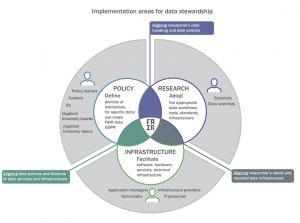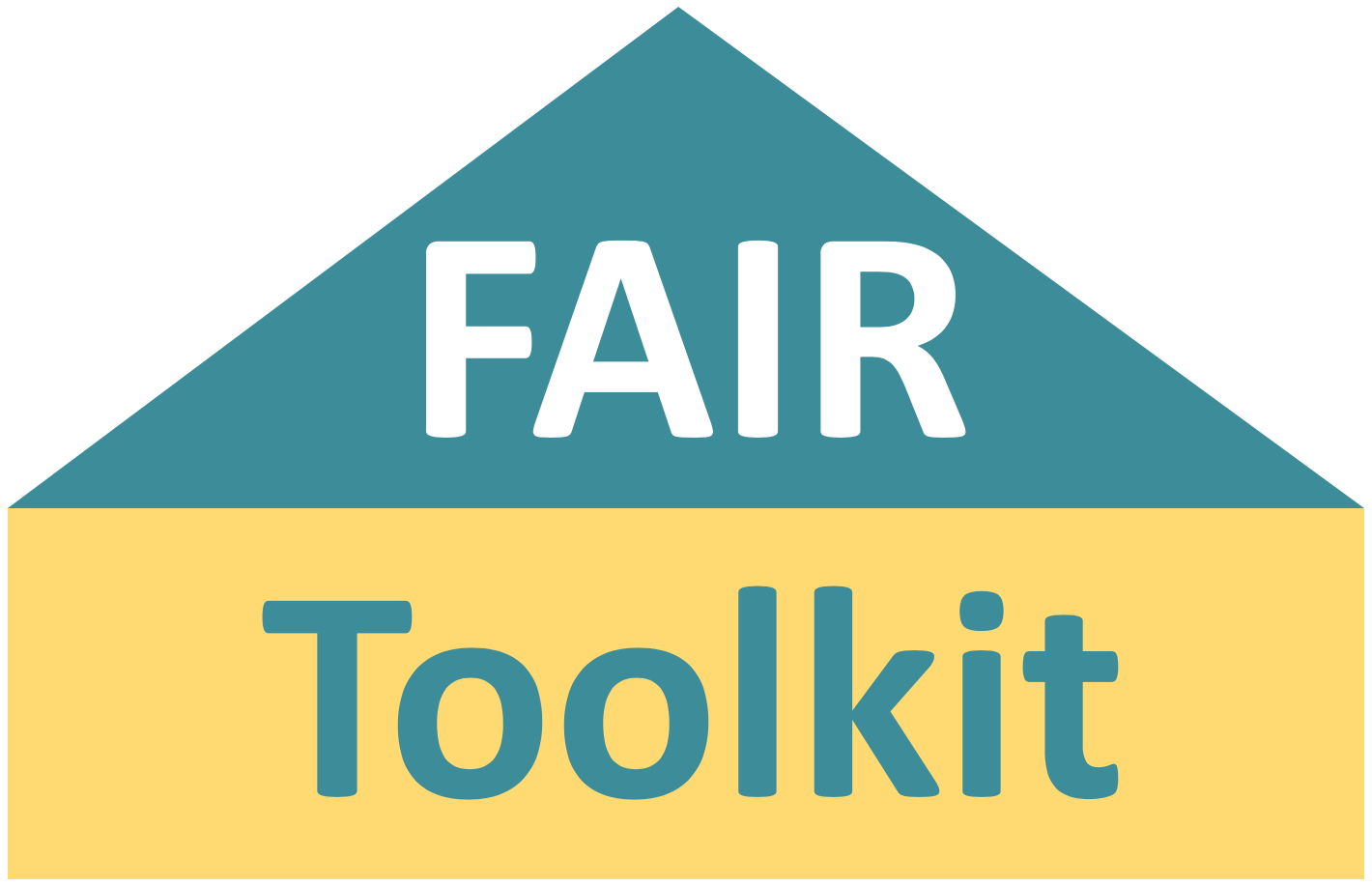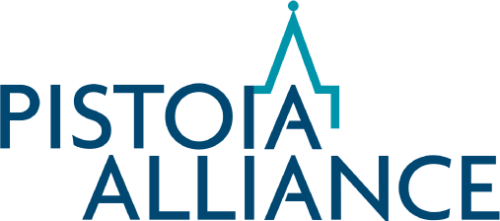Data Stewardship
Learn how the responsibilities and competencies for data stewardship provides important expert advice and suport for FAIR data management.
- A growing need for data stewardship competences in life science industry
Overview
Data stewardship is a coordinated set of activities that ensure that data are findable, accessible, interoperable, and reusable (FAIR) in a sustained manner. Such FAIR data management is an ongoing and iterative process that is continually refined and tailored to suit the needs of a particular business application or use case as described in the Data stewardship handbook (HANDS) [1,2]. Although HANDS was written primarily for academic institutions, most aspects can be transferred to meet the needs of any industrial organisation.
Fundamental to the many facets of data stewardship is the role of a data steward in life sciences which has been defined recently through partnership between Radboud University, UMCG and DTL on the ZonMw project [3,4,5]. FAIR data stewardship covers three interconnected areas of policy, research and infrastructure which involves policy makers, scientists and infrastructure providers as illustrated in Figure 1 below from the ZonMw project [3]:

Figure 1: Competency areas for data stewardship (Source: Towards FAIR data steward as profession for the lifesciences [3])
How To
Eight areas of responsibility and competence for the role of data steward have been adapted from the ZonMw project [3] for application by life science industry:
- Policy and strategy
- Responsible for advice on and development, implementation and monitoring of a policy for FAIR Data Management (FDM) and strategy for the organisation, which includes the complete data life cycle and supports FAIR data, in alignment with the relevant stakeholders and within financial and legal constraints. The policy is the basis for project Data Management Plans (DMPs) – see the DMP method in this toolkit.
- Develops, implements and monitors the organisation’s FDM policy.
- Advises the organisation’s management on short- and long-term actions to advance FDM in the organisation.
- Assesses and monitors the organisation’s time and financial investments in relation to the organisation’s needs for FDM.
- Explores new needs, opportunities and trends in FDM.
- Responsible for advice on and development, implementation and monitoring of a policy for FAIR Data Management (FDM) and strategy for the organisation, which includes the complete data life cycle and supports FAIR data, in alignment with the relevant stakeholders and within financial and legal constraints. The policy is the basis for project Data Management Plans (DMPs) – see the DMP method in this toolkit.
- Compliance
- Responsible for compliance of the FDM policy to meet the needs of the organisation and General Data Protection Regulation (GDPR) or equivalent, as well as continuous alignment with any appropriate legal and ethical standards.
- Ensures compatibility of the FDM policy and monitors compliance.
- Contacts the organisation’s privacy officer, legal advisors or ethical board in case of questions regarding compliance.
- Translates relevant policies from the legal/privacy officer to FDM practice within an organisation.
- Develops and/or guides standard solutions for recurring data issues and for data classification, including input for relevant data protection policies.
- Responsible for compliance of the FDM policy to meet the needs of the organisation and General Data Protection Regulation (GDPR) or equivalent, as well as continuous alignment with any appropriate legal and ethical standards.
- Alignment with FAIR data principles
- Responsible for alignment of the data management policy to the FAIR data principles and alignment to the organisation’s policy for publication of data and documents.
- Ensures compatibility of the FDM policy and monitors alignment to the FAIR data principles.
- Provides advice and support on improvements identified from the FAIR maturity indicators – see the corresponding four methods in this toolkit.
- Findability (F) of data, including adequate data-infrastructure and tools, persistent identifiers and rich (discipline-specific) metadata standards.
- Accessibility (A) of (meta)data to potential (re)users.
- Interoperability (I) of data, including broadly applicable languages, vocabularies and other relevant standards such as ontologies and mappings
- Reusability (R) of data, including documentation and licenses with the conditions for reuse, data licences, IP rights, provenance and relevant standards
- Responsible for alignment of the data management policy to the FAIR data principles and alignment to the organisation’s policy for publication of data and documents.
- Services
- Responsible for the availability of adequate support on FDM, in staff or services, for the researchers and research support staff of the organisation.
- Advises management, researchers and support staff of the organisation on FDM support.
- Initiates or supervises the set-up and update of suitable support facilities or services in the organisation.
- Monitors the development and implementation of (standard) solutions for recurring FDM issues and questions.
- Monitors the availability of sufficient support staff and initiates hiring or training of staff.
- Communicates and stimulates the use of available services by researchers.
- Responsible for the availability of adequate support on FDM, in staff or services, for the researchers and research support staff of the organisation.
- Infrastructure
- Responsible for identifying the requirements of adequate data-infrastructure for compliance with the organisation’s FDM policy and alignment to data-infrastructure and tools (from inside and outside the organisation).
- Initiates and supervises requests and acquires data-infrastructures and tools for FDM within the organisation.
- Supervises monitoring of the need, use and availability of data-infrastructures and tools.
- Advises the management of the organisation on data-infrastructures and tools.
- Is aware of and advises the organisation on relevant (inter)national data-infrastructures.
- Responsible for identifying the requirements of adequate data-infrastructure for compliance with the organisation’s FDM policy and alignment to data-infrastructure and tools (from inside and outside the organisation).
- Knowledge management
- Responsible for determining the adequate level of knowledge and skills on FDM within the organisation in order to comply with the organisation’s FDM policy.
- Monitors FDM skills of the scientists and support staff within the organisation.
- Identifies knowledge and skill gaps and ensures appropriate training.
- Ensures a sufficient level of awareness among scientists and support staff of the organisation.
- Responsible for determining the adequate level of knowledge and skills on FDM within the organisation in order to comply with the organisation’s FDM policy.
- Network
- Responsible for obtaining and maintaining a network of aligned expertise areas and relevant partners inside and outside the organisation with regard to FDM.
- Refers researchers to other FDM related facilities and services (legal, financial and/or operational), inside and outside the organisation.
- Liaises with experts inside and outside the organisation.
- Maintains a network with FDM related colleagues and other relevant partners.
- Connects data support people with each other.
- Responsible for obtaining and maintaining a network of aligned expertise areas and relevant partners inside and outside the organisation with regard to FDM.
- Data archiving
- Responsible for identifying the requirements of adequate support and data infrastructure for FAIR and long-term archiving of data of the organisation, stored internally as well as externally, and for sustainable and legitimate access to data sources of the organisation, for the required period.
- Develops, implements and monitors the organisation’s internal and/or external data archiving and access policy.
- Monitors the internal and/or external archiving of data by researchers of the organisation.
- Assesses whether internal and/or external data storage and archiving facilities meet the applicable requirements.
- Responsible for identifying the requirements of adequate support and data infrastructure for FAIR and long-term archiving of data of the organisation, stored internally as well as externally, and for sustainable and legitimate access to data sources of the organisation, for the required period.
References and Resources
- Jansen P et al 2019 Research Data Stewardship for Healthcare Professionals Chapter 4 Fundamentals of Clinical Data Science Eds. Pieter Kubben, Michel Dumontier, and Andre Dekker. ISBN-13: 978-3-319-99712-4 Scholtens S et al 2019 Final report: https://www.ncbi.nlm.nih.gov/books/NBK543527
- Data stewardship handbook (HANDS) https://www.health-ri.nl/data-stewardship-handbook-hands
- Towards FAIR data steward as profession for the lifesciences. Report of a ZonMw funded collaborative approach built on existing expertise. DOI: 10.5281/zenodo.3474707
- Function and competencies matrices for three types of data stewards ‘policy’. ‘research and ‘infrastructure’ DOI DOI: 10.5281/zenodo.3239079
- Professionalizing FAIR Data Stewardship in the life sciences: defining job criteria & skills https://www.dtls.nl/2019/10/21/professionalizing-fair-data-stewardship-in-the-life-sciences-defining-job-criteria-skills
At a Glance
Related use cases
Related methods
Setting
- Data stewardship provides expert advice and support for FAIR data management
Team
- Data stewards could be embedded throughout a large organisation. They could also function in a coordinated manner as a network or team of change agents.
- Team allies are likely to be:
- Data collectors such as research scientists, clinical investigators and data scientists
- IT experts responsible for infrastructure
- Managers
Timing
- Ongoing and sustained
Difficulty
Medium

